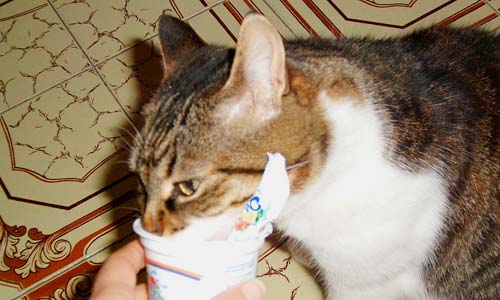
So we’ve told you about the Human Micro-Biome here before.
That collection of microbes on & in us doesn’t just sit there, it affects us.
And so far it looks connected to at-least stress, heart-disease, and obesity.
Well Scientists have done a few more experiments and it turns out, just like the crazy-cat-lady-disease, the microbiome can also affect…
-your MIND!
How?
Well gut-bugs don’t just digest your food or help dispose of waste.
They also produce many drug-like chemicals, vitamins, toxins, and strangely-enough,… -Neurotransmitters.
Scientists think these microbes make about 50% of the ones specifically tied to Mood, Anxiety and Depression. Those are: Dopamine, Serotonin & GABA.
(and guess what type of snack people reach for when they’re down. -Sugary or starchy ones, right? Which raise your…? Blood-Sugar, AND… Serotonin Levels!)
So, not only do they make chemicals, but the different groups of bacteria also communicate with each other, change their production, and also the balance between the relative sizes of each colony based on:
- The food, drink, vitamins/supplements, and meds we take in.
- The other microbes we’re exposed to.
- Our psychological and stress states.
The Experiments:
-Anxiety:
Scientists took all the gut-microbes out of test-mice by giving them antibiotics, or raising them in a sterile environment.
These mice turned out to be more adventurous and had less anxiety than others.
Scientists also gave the adventurous mice and monkeys the gut bugs of the anxious animals.
These animals then displayed all the behavior of their anxious counterparts.

-Stress:
Another researcher even took some gut-bugs associated specifically with Stress, and fed them the chemical we produce when we get stressed.
Their growth-rate exploded.
The same doctor also showed that when an animal was stressed, its immune system didn’t get better as a defense, the animal just got sick.
This case was shown both in mice and in feedlot cattle.
-So there is a possibility that the bacteria which overgrow under those conditions are partly the cause of getting sick.
-OCD:
In another experiment, mice with repetitive behaviors were given a specific strain of bacteria called B. Fragilis.
The repetitive behavior stopped.
-The Gut-Brain Connection:
Not only are mood-altering neurotransmitters produced in our guts, but there is at least One Major Nerve that connects it to our brain; possibly right into the fear-center.
In one experiment, a researcher cut the connection of that nerve to the brain in a mouse that was no longer anxious.
The anxious behavior came back and the probiotic diet it was on stopped working.
-So: Your brain very likely knows at least something about what’s in your digestive tract & changes your mood and behavior based on that.
It’s even possible that some of the neurotransmitters produced in the gut even make it into the brain, despite barriers to entry*.

-Specific Microbes:
Another example, and of a specific bug, is that mouse mothers give less of a microbe called L.Rhamnosus to their babies when they’re stressed.
Rhamnosus is directly-linked to more calm behavior, higher GABA levels, and less Anxiety in the mice from the experiments.
To test that, one researcher increased the Rhamnosus bacteria in an anxious mouse.
The anxious behavior went away.
… By the way, guess which neurotransmitter is coincidentally the target of many Anti-Depressant Drugs?
-GABA.
-Initial Human Tests:
A pair of desperate parents with an anxious OCD+ADHD kid who couldn’t be cured went to see yet another doctor in a long string of them.
So in response to their strange problem, he asked a strange question: Did Mary have any intestinal problems? They said yes.
Because strangely-enough, *one of the many theories is that microbe-imbalanced structural-faults in the intestine-lining might be letting toxins or excessive chemicals into the bloodstream, possibly even past the other barriers and into the brain; just like the crazy-cat-lady microbes.
So in light of that, the doctor did something very clever and put Mary on both anti-depressants and High-Dose Probiotics.
The girl who no doctor could fix was cured in less than 1 year.
Mary’s doctor and others even guess that the intestinal-structure theory might be involved not just in OCD and ADHD, but even in some cases of Autism.
-Especially because antibiotics and restrictive diets help in some instances of that disorder.

In Closing:
So after more than a decade of the scientific-journal-overlords scoffing at the idea of microbes affecting our psychology and behavior, we’re finally starting to learn that the human micro-biome may necessitate more than just another Activia commercial.
It quite-possibly affects at least one aspect of your health right now, and will probably be found to affect it even further as time and studies progress.
Check out the Links for further details:
PS:
None of this is meant to say that running out and taking a bunch of random antibiotics or probiotics is a good solution. Many of the researchers say it’s far too early to know the details, and going about it willy-nilly could be dangerous.
It will take awhile, possibly a decade, to find out the exact mix of probiotics different people should be taking for each specific issue.
PPS:
Though it is still a little funny our ancient forefathers were such avid fans of all kinds of (microbially) fermented foods though, eh?…
Photo Credits:
“pucci mangia lo yogurth”, by Flickr user klio
“Week 52: Shadows”, by Flickr user Rachel Adams
“PATOLA CONNECTION”, by Flickr user whologwhy
“The Link”, by Peter Ong
Links:
• Source: NYT-Can Bacteria Explain Your Mood
• More Coverage: Wired-The Psychology of Yogurt | PT-Do Brobiotics Help Anxiety? | TheVerge-Gut Feelings, The Future of Psychiatry | CalTech-Probiotic Therapy Alleviates Autism-like Behaviors in Mice | PT-Groovy Probiotics
• Source Studies:
Phys&Behavior-Anxiogenic effect of subclinical bacterial infection in mice in the absence of overt immune activation














